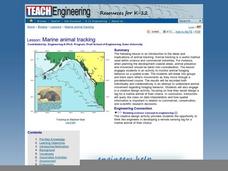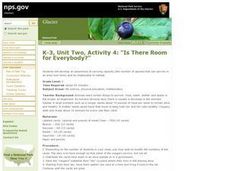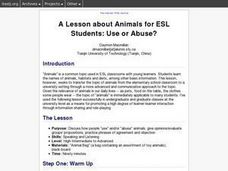Prince William Network
Migration Headache
During this game, kids become migratory shorebirds and fly among wintering, nesting, and stopover habitats. If they do not arrive at a suitable habitat on time, they do not survive. Catastrophic events are periodically introduced that...
Curated OER
Guess Who?
Getting ready for a lesson on animal adaptations can be a lot of fun. Kindergartners will go on an egg hunt. Once they have collected all the eggs, they will open them up to reveal an image of an animal. Each pupil will act out...
Curated OER
Animal Colors and Shapes
Students investigate the natural characteristics of animals by completing a coloring activity. In this animal properties activity, students investigate the reasons different animals have specific colors, and how it is essential for...
Curated OER
Move it Like An Animal
Students investigate how animals move. In this animals lesson, students use pictures of animals and demonstrate how each of them moves from place to place.
Curated OER
Burs in Your Furs
Students explore the concept of animal welfare. In this wild animal habitats lesson plan, students discover the work of wild animals in sustaining their habitats as they participate in a classroom simulation. Students discuss how...
Curated OER
Marine Animal Tracking
Students engage in a lesson which serves as an introduction to the ideas and implications of animal tracking. They monitor animal foraging behavior on a spatial scale. The students break into groups and track each other's movements as...
Curated OER
Is There Room for Everybody?
Third graders examine the capacity of animals able to live in one habitat. For this habitat lesson, 3rd graders play a game that shows the food chain and the interactions between animals in an area. Students discover that food is a major...
Howard Hughes Medical Institute
Niche Partitioning and DNA Metabarcoding
What is DNA metabarcoding? Show your biology class the latest method for studying biodiversity in an ecosystem with a fun, informative interactive. Individuals examine the animal species that compete for vegetation, then learn how their...
Curated OER
Hide and Seek
Students explore animal characteristics by creating a poster presentation in class. In this animal habitat lesson, students visit the local zoo and identify which habitats certain animals are most comfortable in. Students answer study...
Curated OER
Wildlife
First, biology pupils research land and marine habitats along the route of skipper Rich Wilson's Great American II. Then, using colored paper clips scattered across a colored paper background, they play the predator-prey game to...
Curated OER
Cut-off Genes
Investigate the relationships between different deep-sea organisms by DNA sequencing. A worksheet provides instructions for DNA sequencing and space to work. They simulate gel electrophoresis by cutting out paper "DNA strands."...
Curated OER
Species Charades
Students identify endangered species. In this endangered species lesson, the teacher leads a discussion about endangered species, then the class plays a game of charades to pantomime animal behavior.
Curated OER
A Lesson about Animals for ESL Students: Use or Abuse?
Students discuss animal care using proper phrases of agreement and objection. They role play and make presentations on their animal studies.
Curated OER
Animal Characteristics
Students investigate the characteristics of animals by creating a chart. For this animal life lesson, students create a KWL chart listing all the different animals a class can name. Students take a field trip to a science facility to get...
Curated OER
Deserts: How Do You Define One?
Second graders identify what constitutes as a desert by reading a habitat checklist. In this environment lesson, 2nd graders read a nature website to discover facts about the desert and where they are located. Students...
Curated OER
Fish Fashion 101
Young scholars explore fish anatomy. For this fish anatomy and adaptation lesson, students define and identify the location of fish body parts. Young scholars add these parts of a fish's anatomy to a life-sized fish costume worn by a...
Curated OER
Matching Games, Trees and Animals
Students identify and define new words as they are introduced to specific trees, leaves, animals and animal habitats, engage in literacy-related play by playing games that focus on animals and trees mentioned in book, A Tree for Me, and...
Curated OER
What's the Difference?
Students analyze the similarities in different species. This lesson plan is part of a multi-segmented unit on the diversity of life. In this segment, students classify shoes to mimic the scientific categories of the classification system.
Curated OER
I See a Coyote
Students role-play coyotes looking for natural resources. In this natural resources lesson, students examine the relationship between animal life and the environment. Students play a game that demonstrates how natural...
Curated OER
All Hands on Deck: A Harbor Education Program
Students build a model of an estuary. In this wetland instructional activity, students build a model estuary with a paint tray and modeling clay. They use the model to illustrate the impact of non-point pollution on the watershed.
Curated OER
Close to Home
Fourth graders examine habitats for animals by creating their own in class environment. For this environment lesson, 4th graders research the Internet for information on certain wild animals and the places in which they live....
Curated OER
Dress Like A Frog
Young scholars recognize amphibian adaptations. In this amphibian lesson students explore amphibian adaptations that provide for successful living in their environments. A volunteer dresses up with all of the adaptations using everyday...
Curated OER
Animal Adaptations
Students use items from boxes to dress up classmates as animals adapted to a given environment.
Curated OER
Habitat Lap Sit
Students examine through role play interdependence of animal and man in their search for the proper arrangement of food, water, shelter and space in the same regions. Students then discuss necessary components of suitable habitat.























